Iran Reportedly Proposes 25-Year Strategic Agreement With India
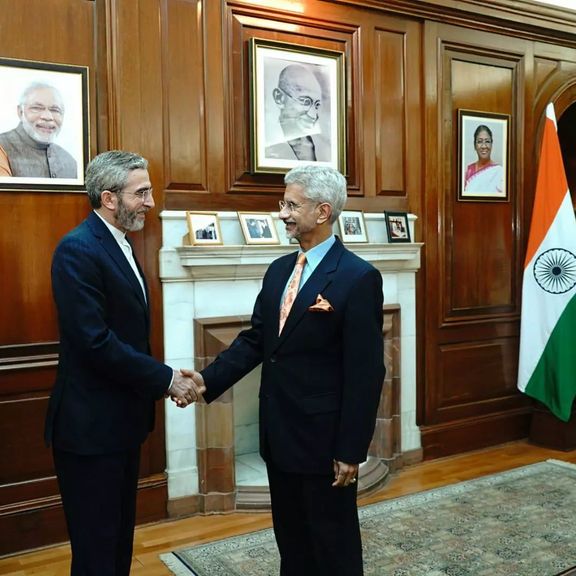
Indian media say Tehran has offered New Delhi a strategic cooperation pact similar to the deal it signed with China in 2021.

Indian media say Tehran has offered New Delhi a strategic cooperation pact similar to the deal it signed with China in 2021.
Livemint website quoted two people aware of the matter on Monday as saying that the sanctions-hit country tries to attract Indian investments to develop its transport and energy infrastructure.
Based on the report, Ali Bagheri Kani, Iran’s deputy foreign minister confirmed the offer in his meetings with a group of experts during his visit to New Delhi last month.
Details of the proposed India-Iran pact are not yet clear. However, the matter is being considered by the Indian ministry of external affairs, sources added.
According to Indian media, a new pact with oil-rich Iran will help the world’s third largest oil consumer deal with high energy prices.
The Iranian regime’s Supreme Leader Ali Khamenei has been pursuing ties with China and Russia as he continues opposing normal relations with West.
The long-term deal Iran signed with China is wrapped in mystery and so far has had little practical results, as US sanctions
Iran's economy has been experiencing a sharp fall in the past four years and foreign investment has also decreased.
The violent suppression of the protests in the last three months has intensified the process of the withdrawal of Iranian and foreign capital and the devaluation of the country's national currency.
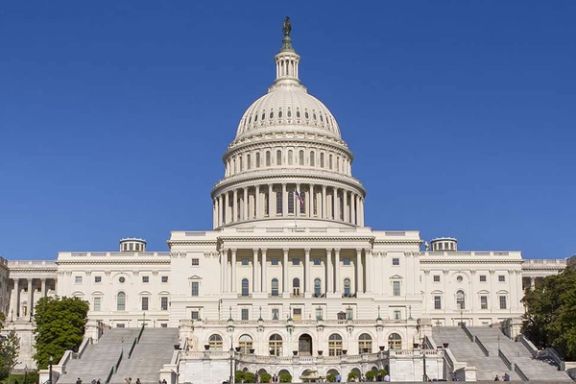
A bipartisan group of US lawmakers have proposed legislation to refuse visas and revoke any issued to Iranian regime insiders and their families.
The initiative is dubbed Revoking Entry Granted to Iranian Mullahs and Elites Act of 2022 or REGIME Act. It would target not only those officials responsible for repression and crackdown on protesters but also their immediate family members, Al Monitor reported Monday.
The legislation would direct the Secretary of State to conduct a review of whether a wide-ranging group of Islamic Republic officials – including members of the Revolutionary Guard (IRGC), Supreme Leader’s office and security forces – and their family members are in possession of US visas or have applied for them.
The legislation is led by Reps. Joe Wilson (R-S.C.), Josh Gottheimer (D-N.J.), Claudia Tenney (R-N.Y.), and Vicente Gonzalez (D-Texas).
It is not clear what sorts of US visas will be impacted if the legislation is adopted. Already, some individuals fitting the criteria might have obtained US permanent residency or even became naturalized citizens.
These individuals can apply for visas for their immediate family members according to US immigration law.
Recently, Canada also issued regulations banning entry for 10,000 IRGC members and possibly people affiliated with Key elements of the Iranian regime.
“In light of the actions of the regime it is particularly unbelievable that Iranian officials and family members are being given visas to come to the US to enjoy the very liberties their own citizens can only imagine,” Wilson told Al-Monitor.
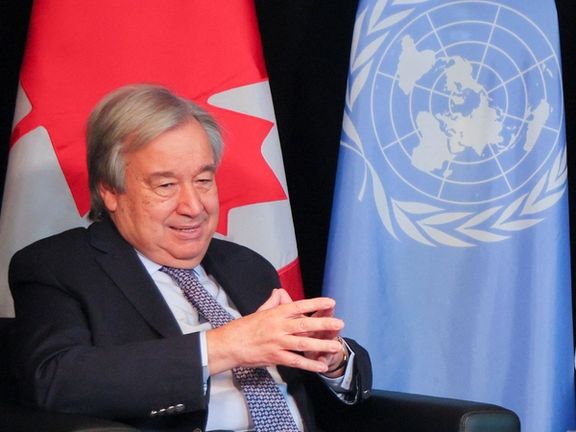
United Nations Secretary-General Antonio Guterres Monday slammed as "totally unacceptable" the crackdown by Iran’s authorities on protests.
In a wide-ranging news conference to close out 2022, Guterres also said that he "will not relent in the pursuit of peace in Ukraine in line with international law and the United Nations Charter." A key principle of the founding UN Charter is respect for sovereignty and territorial integrity.
He is "not optimistic" about the possibility of effective Ukraine and Russia peace talks in the immediate future and believes the military confrontation will go on but added that he "strongly hopes" there can be an end to the war in 2023.
The General Secretary added on Iran that "we are witnessing massive violations of human rights that we strongly condemn."
He also said there is a risk of losing the 2015 Iran nuclear deal known as JCPOA. Long negotiations since April 2021 between the West and Iran came to an impasse in September and since, the United States and European powers say they are focused on the human rights situation in Iran and not on the JCPOA.
The UN Human Rights Council has slammed Iran’s violations and decided to launch an investigation into killings and large-scale imprisonments. Iran was also expelled last week from the UN Commission on the Status of Women, in a drive led by the US.
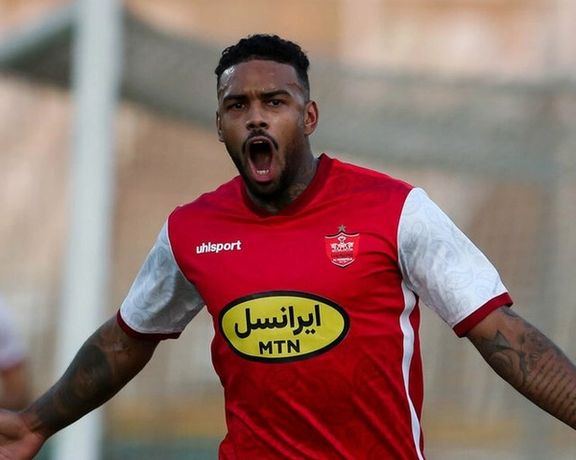
The Dutch striker of a popular football club in Iran has left the country amid the security concerns over the safety of foreigners.
Hours after the sudden departure of Jurgen Locadia, the striker of Tehran’s Persepolis club, it was announced that he did not leave Iran because of his wife's illness, as reported, but "for other reasons".
At the same time, reports say Locadia was concerned following the Dutch government’s warning to its nationals not to remain in Iran.
Locadias communication with his family had become very tough due to the state of the Internet in Iran, some other reports added.
Tasnim news agency quoted Persepolis club as saying that footballer told the club managers that he should leave Iran due to family problems and his wife's illness.
When he faced resistance by the team managers, he left Iran quickly on the eve of an important derby match in Tehran.
The managers of Persepolis said the player's wife is not sick and there are probably other reasons they are not aware of, added Tasnim.
Since the beginning of nationwide protests in Iran in the past three months, other European countries such as Germany, France and Belgium have also demanded the immediate departure of their citizens from Iran.
The 28-year-old striker was a member of VfL Bochum last season.
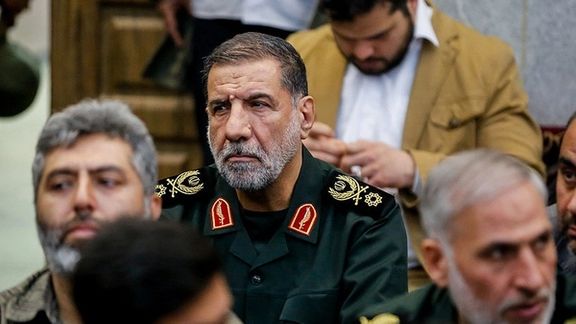
An Iranian lawmaker says the Islamic Republic intends to reduce ties with the United Kingdom and revise relations with France and Germany for their “anti-Iranian moves”.
Esmail Kowsari said Monday, “We have always witnessed the anti-Iranian actions of European countries, Germany, France and England,” claiming that “we do not want relations with them at any cost.”
He did not explain which action of the Europeans was anti-Iranian but referring to the law approved in 2011 to reduce diplomatic and economic ties with Britain, he said “this should be pursued in the parliament, especially by the members of the National Security Commission.”
Western powers have sharply criticized Iran for its human rights violations during 3 months of protests and imposed sanctions on many officials and entities.
In November 2011, Britain imposed sanctions on the Islamic Republic for its nuclear program and the banking relations of the two countries stopped.
The Iranian parliament voted in favor of reducing ties at the diplomatic level, and two days later, a mob of Basij militia and hardliner activists attacked the UK embassy in Tehran ransacking offices and stealing documents.
However, in 2016, the diplomatic relations between London and Tehran were once again improved and Britain sent a new ambassador.
In the past three months, Tehran have linked the popular protests to a conspiracy by “foreign powers, including European countries.”
European countries reject such claims, repeatedly urging the Iranian regime to listen to the voice of the people.
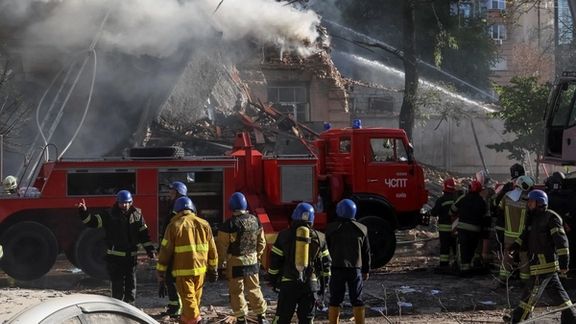
A Ukrainian senior intelligence official says Russia has received a new shipment of Iranian-made Shahed-136 kamikaze drones from the Islamic Republic of Iran.
According to Ukraine’s defense intelligence (GUR) spokesman Andriy Yusov, the new shipment is smaller than the previous one sometime in the summer that is estimated to have included at least 400 UAVs.
Russia used the initial supply in October and November, but reports from Ukraine indicated that for 2-3 weeks no Iranian drones were deployed from mid-November, indicating a possible shortage.
"This is a new batch [of Shahed drones], we do not comment on its size, but we see that Shaheds were not used during yesterday's massive terrorist missile strikes. All other available weapons were used, and these were all missiles and no Shaheds. This is a new batch, but this one, compared to the initial mass use of Shahed, is obviously smaller," said Yusov on Sunday.
Iran's foreign minister Hossein Amir-Abdollahian once again denied Iran has supplied drones to Russia to be used against Ukraine, in a speech in Tehran on Monday, while previously he had acknowledged having provided drones to Moscow "before the Ukraine war began."
Ukrainian president Volodymyr Zelensky in October said that Russia has ordered 2,400 of the suicide drones from Iran. But Iran’s production is slow, and it also needs to save enough of the UAVs for its own military.
Yusov also spoke of previous agreements reached between Russia and the Islamic Republic regarding the supply of ballistic missiles, saying, "As of today, we have not seen Iranian ballistic missiles in Russia for use against Ukraine, although such a possibility exists, and this information is being monitored. Also, certain efforts are being made to ensure that this scenario is not implemented. But there is such a threat.”
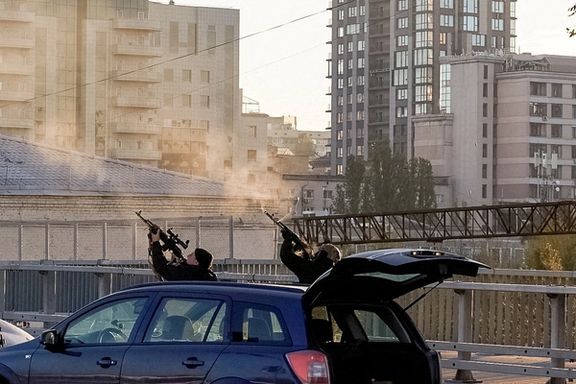
As reported by Ukrinform, overnight December 14, Russian armed forces attacked Ukraine with Iranian-made Shahed-136/131 kamikaze drones. All 13 UAVs were shot down by air defense forces.
The EU Council of Foreign Ministers adopted a resolution condemning Iran’s action in supplying weapons to Russia for use in its war of aggression against Ukraine.
Earlier in December, Kyiv's air defense systems shot down 10 Iranian-made drones, while the United States is closer to sending its Patriot air defense system to Ukraine. Kyiv Mayor Vitali Klitschko said that air-defense systems shot down 10 Iranian-made Shahed drones and that there were explosions in the central Shevchenkivskyi district.
The Patriot system would help Ukraine defend against waves of Russian missile attacks that have pounded the country's energy infrastructure, but are not expected to be used against cheap drones, as each missile costs $4 million, while Iranian drones are worth just $20,000.
The United States and its European allies have also imposed rounds of sanctions against Iranian individuals and entities for their involvement in supplying drones to Russia. The latest instance of such sanctions was announced by the United Kingdom on Tuesday.
Foreign Secretary James Cleverly said UK sanctions were “taking the wheels off the Russian war machine.” A press release referred to “information” released by the US December 9 - apparently a statement by White House Security spokesman John Kirby - showing Iran had become “one of Russia’s top military backers.”
The Pentagon says Russia's recent surge in missile strikes is partly designed to exhaust Ukraine's supplies of air defenses so it can dominate the skies above the country.
For that reason, the United States and its allies have been delivering more air defenses to Kyiv, everything from Soviet-era systems to more modern, Western ones. Washington has provided NASAMS air defense systems that the Pentagon says have flawlessly intercepted Russian missiles in Ukraine.